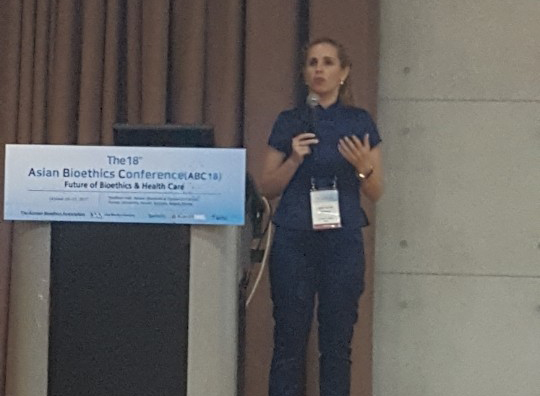The challenges facing patients in multilingual and multicultural countries are different languages and cultures that can lead to life-threatening communication gaps, a bioethics expert said Thursday.
“Good communication is of paramount importance in healthcare delivery because patients need to ask questions and seek assistance,” said Professor Vera Lucia Raposo of the University of Macau. “Patients also need to respect the cautions and limitations advised by the medical team as well as understand how the healthcare system operates and which services are available.”
Raposo made these and other points in the 18th Asia Bioethics Conference on “Future of Bioethics & Healthcare” held in Severance Hospital Avison Biomedical Research Center, Seoul.
She noted that hospitals should provide patients with audio records or written documentation in the patient’s primary language while using reliable software applications that can operate without failure while in a specified environment over a set duration of time.
There are risks of too literal -- and sometimes insignificant -- translations that can render useless information, causing the lack of interpersonal contact in the relationship between doctors and patients, Raposo added.

“Hospitals can train healthcare staff to operate as translators, keep a permanent interpreter in hospitals, or resort to external translators who can be called in whenever necessary,” the professor said. “However, this may be difficult to implement, especially in hospitals that receive patients from many different nationalities and external translators may take a while to respond, making an unfeasible solution for emergency treatments.”
Translators are not bound to medical secrecy as a professional duty; she went on to say. “It is necessary to bind those using contractual clauses,” Raposo noted.
The most frequent solution in hospitals worldwide is using family members as translators. Although families have the lack of preparation to translate, the family can modify bad news to their loved ones, she said.
Different cultures can also be another communication gap. For example, issues related to nudity and sex is different between Western and Asian cultures when consulting with physicians. Special rituals in funerals can also disrupt patients in hospitals who have different cultures.
Raposo described her experiences living as a foreigner in Macau as an example. The Special Administrative Region of Macau is part of the People’s Republic of China but maintains the constitutional principle “one country, two systems, formulated by the late paramount leader Deng Xiaoping. Although Macau has two official legal languages—Mandarin and Portuguese—they are now hardly spoken, as most citizens use English or Cantonese.
“Because of this language paradox, public hospitals in Macau have language issues,” the professor said. “Each consent form they provide has three different languages, but oral communication is awkward because each party does not share a common language, making crucial information lost in different translations.”
Parties who volunteer to communicate in a given language do not mean that they have the necessary proficiency in that language, Raposo said. “We must try to be more creative in solving these issues that are happening in multilingual and multicultural countries,” she added.

